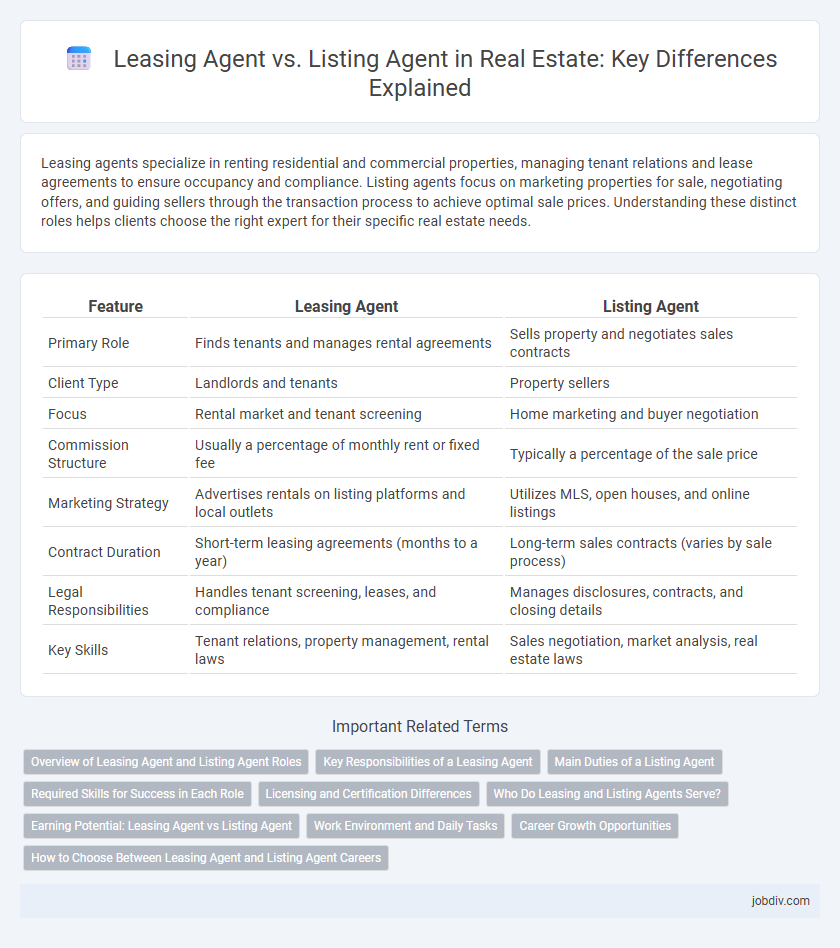Leasing agents specialize in renting residential and commercial properties, managing tenant relations and lease agreements to ensure occupancy and compliance. Listing agents focus on marketing properties for sale, negotiating offers, and guiding sellers through the transaction process to achieve optimal sale prices. Understanding these distinct roles helps clients choose the right expert for their specific real estate needs.
Table of Comparison
| Feature | Leasing Agent | Listing Agent |
|---|---|---|
| Primary Role | Finds tenants and manages rental agreements | Sells property and negotiates sales contracts |
| Client Type | Landlords and tenants | Property sellers |
| Focus | Rental market and tenant screening | Home marketing and buyer negotiation |
| Commission Structure | Usually a percentage of monthly rent or fixed fee | Typically a percentage of the sale price |
| Marketing Strategy | Advertises rentals on listing platforms and local outlets | Utilizes MLS, open houses, and online listings |
| Contract Duration | Short-term leasing agreements (months to a year) | Long-term sales contracts (varies by sale process) |
| Legal Responsibilities | Handles tenant screening, leases, and compliance | Manages disclosures, contracts, and closing details |
| Key Skills | Tenant relations, property management, rental laws | Sales negotiation, market analysis, real estate laws |
Overview of Leasing Agent and Listing Agent Roles
Leasing agents specialize in managing rental properties by marketing vacancies, screening tenants, and facilitating lease agreements, ensuring property owners maximize occupancy rates. Listing agents focus on selling properties, handling market analysis, pricing strategies, property showings, and negotiating sales contracts to achieve optimal sale prices. Both roles require strong communication skills and market knowledge but differ primarily in transactional focus--leasing for rentals and listing for sales.
Key Responsibilities of a Leasing Agent
A Leasing Agent specializes in securing tenants for rental properties by marketing available units, conducting property showings, and processing rental applications. Their key responsibilities include screening potential renters, preparing lease agreements, and managing move-in and move-out inspections. Leasing Agents also handle tenant inquiries and facilitate communication between property owners and tenants to ensure smooth lease transactions.
Main Duties of a Listing Agent
A listing agent is primarily responsible for marketing and selling a property on behalf of the seller, including setting competitive prices based on market analysis. They coordinate property showings, negotiate offers, and manage contracts to ensure a smooth transaction. Skilled in pricing strategy and market trends, listing agents help maximize the seller's return on investment.
Required Skills for Success in Each Role
Leasing agents excel with strong communication and negotiation skills, customer service expertise, and in-depth knowledge of rental laws and property management. Listing agents require proficiency in market analysis, sales techniques, marketing strategies, and contract law comprehension to effectively sell properties. Both roles demand exceptional interpersonal skills and attention to detail to succeed in real estate transactions.
Licensing and Certification Differences
Leasing agents typically require a real estate license focused on rental property transactions, while listing agents must obtain a full real estate license enabling them to market and sell properties. Certification programs for leasing agents often emphasize tenant screening and lease agreements, whereas listing agents pursue certifications in property valuation and sales negotiation. Licensing requirements vary by state, making it essential for agents to comply with local real estate commission regulations to maintain their credentials.
Who Do Leasing and Listing Agents Serve?
Leasing agents primarily serve tenants by helping them find rental properties that match their needs and negotiating lease terms. Listing agents represent property owners, marketing homes or commercial spaces for sale and aiming to secure the best possible price. Both agents act as intermediaries, but leasing agents focus on rental agreements while listing agents concentrate on property sales.
Earning Potential: Leasing Agent vs Listing Agent
Leasing agents typically earn income through commissions based on rental agreements, often receiving a percentage of the lease value, which can result in steady, recurring earnings from multiple tenants. Listing agents, however, usually command higher commissions derived from sales transactions, frequently earning around 5-6% of the property's sale price, presenting greater earning potential per deal but with less frequency. The variability in market conditions and property values significantly impacts the income stability and scaling opportunities for both leasing and listing agents.
Work Environment and Daily Tasks
Leasing agents primarily work in rental properties, interacting daily with prospective tenants, property managers, and maintenance staff to coordinate viewings, handle lease agreements, and address tenant concerns. Listing agents operate in residential or commercial real estate markets, focusing on marketing properties, conducting open houses, negotiating sales, and collaborating with buyers, sellers, and inspectors. Both roles require strong communication skills but differ in pace, with leasing agents often managing ongoing tenant relationships and listing agents navigating shorter, transaction-focused timelines.
Career Growth Opportunities
Leasing agents typically gain experience managing rental properties and tenant relations, providing foundational skills that can lead to roles in property management or leasing supervision. Listing agents focus on marketing properties and negotiating sales, which can open pathways to becoming a real estate broker, sales manager, or even starting an independent real estate firm. Both career paths offer growth opportunities, but listing agents often have higher earning potential and advancement prospects due to commission-based sales and broader industry recognition.
How to Choose Between Leasing Agent and Listing Agent Careers
Choosing between a leasing agent and listing agent career depends on your preferences for client interaction and transaction types. Leasing agents specialize in rental agreements, working with tenants and landlords for shorter-term contracts, while listing agents handle property sales, requiring expertise in marketing and negotiation for longer-term investments. Evaluate your skills in sales versus rental management, desired income stability, and local market demand to determine the best career path in real estate.
Leasing Agent vs Listing Agent Infographic

 jobdiv.com
jobdiv.com